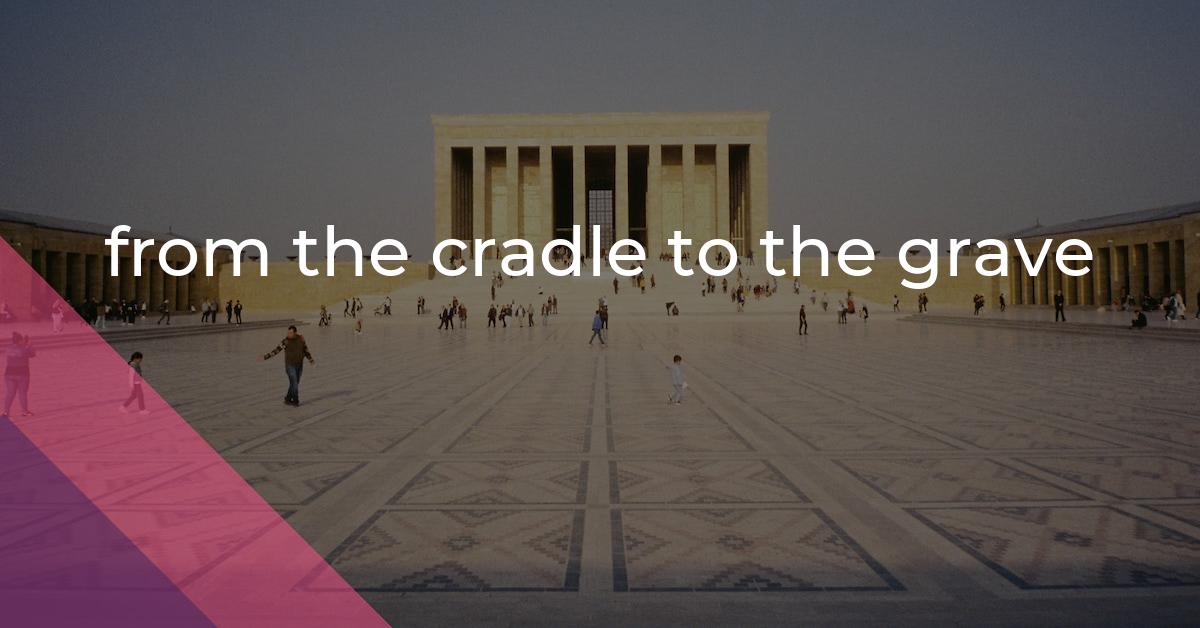from the cradle to the grave: Idiom Meaning and Origin
What does ‘from the cradle to the grave’ mean?
"From the cradle to the grave" means throughout someone's entire life, from birth until death.

Idiom Explorer
The idiom "in all one's born days" expresses the idea of someone's entire lifetime or existence. It emphasizes the length of time a person has lived and implies surprise or disbelief at a particular event or experience.
The idiom "head to toe" means completely or fully, often referring to being covered or dressed from head to toe in something.
"Go the distance" means to complete a task or achieve a goal, even if it requires great effort or perseverance.
The idiom "give birth" means to have a baby or to bring a new life into the world.
The idiom "from womb to tomb" means from birth to death; throughout a person's entire life.
The idiom *from the word go* means from the very beginning or start of something.
The idiom "from stem to stern" means covering the entire length or extent of something, typically referring to a physical object, such as a ship. It implies a thorough or comprehensive examination or understanding.
"From soup to nuts" is an idiom used to describe a comprehensive or complete range of things or activities, covering everything from the beginning to the end.
The idiom "from here to Sunday" means extensively or thoroughly. It emphasizes the vastness or completeness of something happening or being done.
The Journey of a Lifetime
The idiom "from the cradle to the grave" is a common phrase that encapsulates the entirety of one's life. It conveys the idea that every individual's existence is marked by a continuous journey, starting with their entry into the world and ending with their eventual demise.
The origin of this idiom is uncertain, as it is difficult to trace the exact moment of its conception. However, its usage can be found in literature and discussions dating back several centuries. One early example can be seen in the writings of William Shakespeare, who used a similar phrase in his play "All the world's a stage" from the comedy "As You Like It." In this passage, the character Jaques poetically describes the different stages of human life, with one stage being "from the cradle to the grave."
The idiom is often used as a metaphorical representation of human existence and the passage of time. It implies that life is a finite journey, with a clear beginning and an inevitable end. It conveys a sense of the universality of this experience, as every individual will ultimately follow this trajectory.
By invoking the image of the cradle, the idiom highlights the vulnerability and dependency of early life. A cradle is typically associated with infancy and childhood, symbolizing a period of innocence and dependence on others for care and protection. This aspect of the idiom emphasizes the early stages of life, when individuals are most reliant on the support and nurturing of others.
The inclusion of the term "grave" speaks to the inevitable reality of death. A grave is a final resting place, representing the end of one's journey on earth. By incorporating this imagery, the idiom acknowledges the inescapable fact that life is temporary and will eventually come to an end. It serves as a reminder of the transient nature of human existence and the universal fate that awaits all individuals.
Furthermore, the idiom "from the cradle to the grave" suggests a sense of continuity and interconnectedness. It implies that every stage of life is linked to the next, forming a seamless progression from birth to death. This notion aligns with the concept of the life cycle, which recognizes the cyclical nature of existence and the interconnectedness of all living beings.
The related idiom "cradle-to-grave" can be used to further illustrate this concept of interconnectedness. It emphasizes the idea that the journey from birth to death is a comprehensive one, encompassing all aspects of life in between. This idiom suggests that every step along the way is important and contributes to the overall narrative of one's existence.
Similarly, the idiom "from womb to tomb" can be used to highlight the beginning and end of life as depicted in the original idiom. By referencing the womb, this idiom emphasizes the starting point of the journey, echoing the notion of vulnerability and dependence associated with the cradle. On the other hand, the term "tomb" mirrors the idea of the grave, symbolizing the final destination and the end of the journey.
The idiom "from the cradle to the grave" encapsulates the entirety of human life, from birth to death. It conveys the universal and inevitable journey that every individual undertakes, highlighting the vulnerability of early life and the finality of death. This idiom serves as a poignant reminder of the transient nature of existence and the commonality of this experience among all individuals. The related idioms "cradle-to-grave" and "from womb to tomb" further emphasize the interconnectedness and comprehensive nature of this journey. Collectively, these idioms speak to the human experience and offer insight into the universal stages we all share.
Example usage
Examples:
1. She has been a loyal supporter of the team from the cradle to the grave. (She has supported the team since childhood and will continue to do so until her death.)
2. The company provides comprehensive healthcare coverage for its employees from the cradle to the grave. (The company takes care of its employees' healthcare needs throughout their lives, from birth to death.)
3. Our family has lived in this small town from the cradle to the grave. (The family has been born, raised, and will eventually be buried in the same town.)
More "Lifespan" idioms



